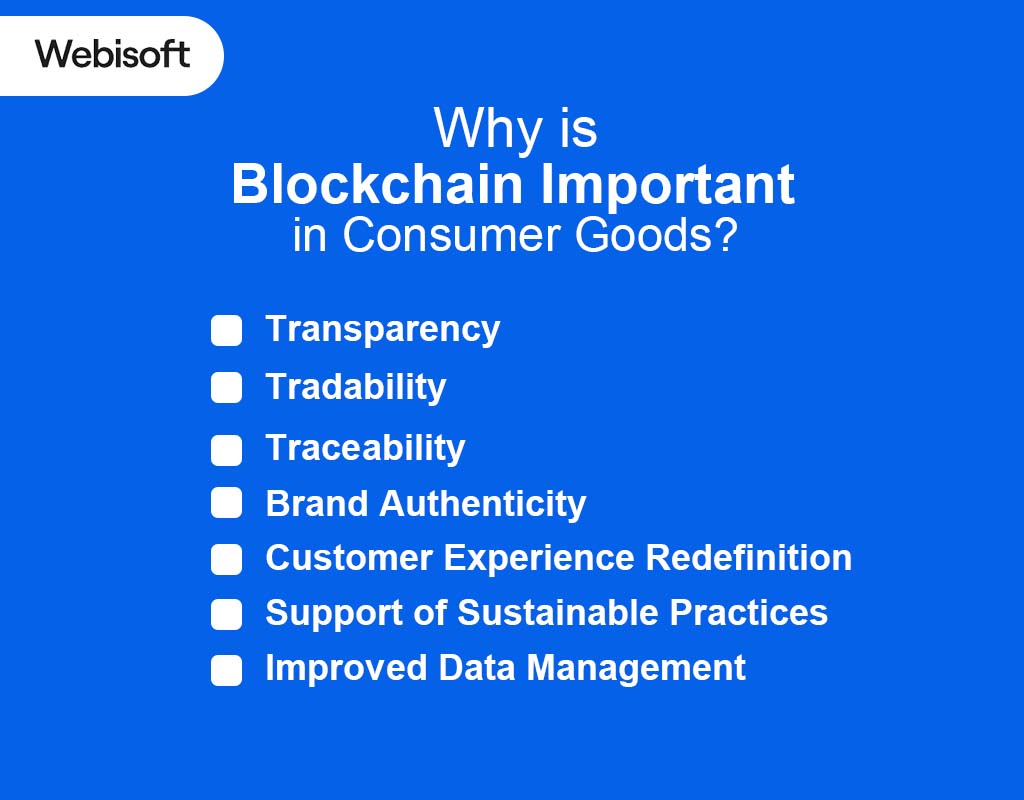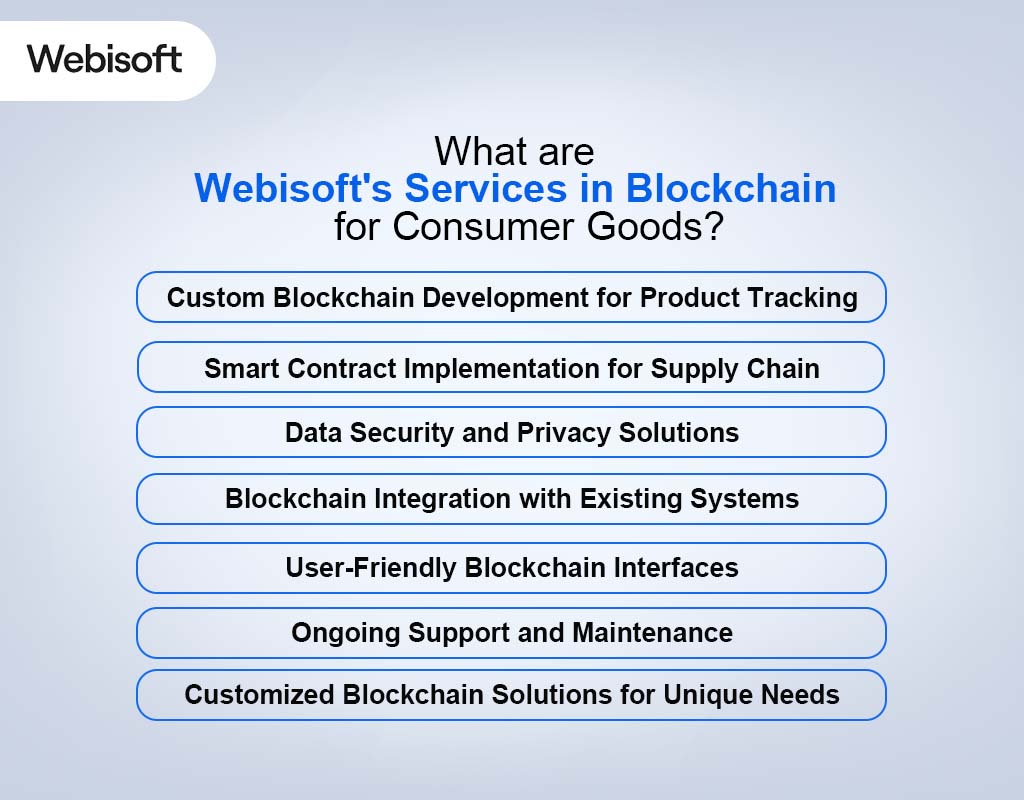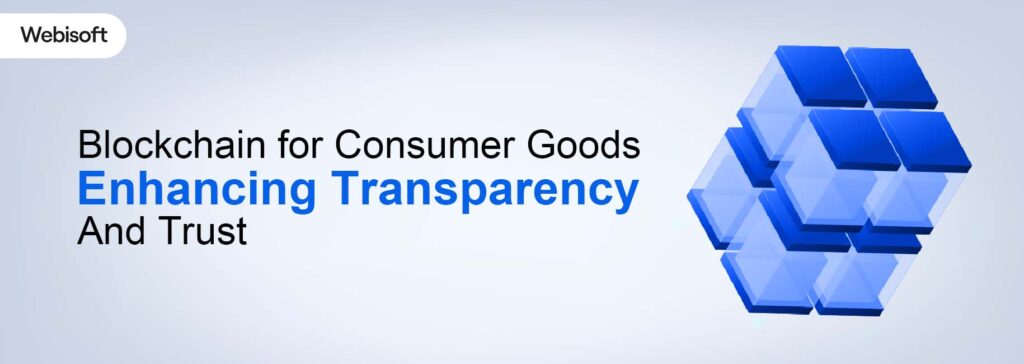Blockchain for consumer goods is like having a secret tool that tracks every product from start to finish. This tech helps you know where your stuff comes from, ensuring it’s real and made the right way. It’s great for earning customer trust and making managing your products easier.
But why choose blockchain? It’s about being honest with your customers and making your work smoother. Webisoft can help you use this technology easily in your business, making things better for you and your customers.
Want to use blockchain in your business? Talk to Webisoft and see how they can help!
Contents
- 1 What is Blockchain for Consumer Goods?
- 2 Why is Blockchain Important in Consumer Goods?
- 3 How Can Blockchain Benefit in Consumer Goods?
- 4 The Challenges in Using Blockchain for Consumer Goods
- 5 What are Webisoft’s Services in Blockchain for Consumer Goods?
- 5.1 Custom Blockchain Development for Product Tracking
- 5.2 Smart Contract Implementation for Supply Chain
- 5.3 Data Security and Privacy Solutions
- 5.4 Blockchain Integration with Existing Systems
- 5.5 User-Friendly Blockchain Interfaces
- 5.6 Ongoing Support and Maintenance
- 5.7 Customized Blockchain Solutions for Unique Needs
- 6 Final Note
- 7 Frequently Asked Questions
What is Blockchain for Consumer Goods?
Blockchain technology for consumer goods is about using a smart tech called blockchain in everyday products. It’s completely secure, keeping all the information safe.
Every time someone buys or sells a product, blockchain records it. This ensures that what you’re buying is the real deal, not a fake. For businesses, it means less worry about counterfeits and theft.
Customers can feel confident that they’re getting quality products. In simple terms, blockchain for consumer goods means more trust and safety in what we buy and use every day.
Why is Blockchain Important in Consumer Goods?

Blockchain is more than just a buzzword in the consumer goods industry; it’s a game-changer that enhances every aspect of your shopping experience.
From ensuring product authenticity to supporting sustainable practices, blockchain development revolutionizes how you interact with consumer products.
However, in the case of consumer goods, blockchain is important for the following reasons:
Transparency
Blockchain technology in consumer goods brings unmatched transparency to your shopping experience. Every product has a digital history, showing you where and how it was made.
This transparency builds trust between you and the brands you choose. It’s about knowing the true story behind every item you purchase.
Tradability
Blockchain’s potential for consumer products extends to tradability. It creates a secure platform for you to trade products with confidence.
This technology ensures that the goods you’re trading are authentic and that transactions are recorded transparently. It opens up new possibilities for securely buying, selling, and exchanging goods.
Traceability
Traceability is a cornerstone of blockchain in the consumer industry. It allows you to track a product’s journey from its origin to your hands.
This level of detail is vital for ensuring quality and safety in the products you use daily. You can be sure that what you’re buying has passed through a verified and safe supply chain management.
Brand Authenticity
Blockchain enhances brand authenticity in the consumer goods market. It helps you verify the authenticity of the brands and products you love.
With blockchain, counterfeit products are easier to spot, ensuring you invest in genuine items. This technology protects both the brand’s integrity and your consumer rights.
Customer Experience Redefinition
Blockchain technology is redefining customer experiences in shopping. It offers you personalized and enhanced interactions with brands. Thanks to blockchain, you can access detailed product information, verify authenticity, and even participate in loyalty programs securely.
Support of Sustainable Practices
Blockchain supports sustainable practices in the consumer goods industry. It helps you identify products made through eco-friendly and ethical processes. This technology encourages transparency in sustainability claims, letting you make informed decisions that align with your values.
Improved Data Management
Finally, blockchain improves data management in the consumer goods sector. It ensures that your personal data, used for personalized shopping experiences, is managed securely and responsibly.
With blockchain, your data isn’t just safe; it’s used to enhance your shopping journey while respecting your privacy.
How Can Blockchain Benefit in Consumer Goods?

Blockchain technology brings a host of benefits to the consumer goods industry. It enhances everything from data security to inventory control, offering a safer, more transparent, and rewarding shopping experience.
With blockchain, the future of consumer goods shopping is here, and it’s more secure, transparent, and customer-focused than ever.
Improvements in Data Security
Blockchain in the consumer industry means better security for your data. When you shop, your personal information is protected by blockchain’s secure encryption.
This technology prevents unauthorized access and breaches, keeping your data safe. You can shop with peace of mind, knowing your details are well-protected.
Better Inventory Control
Blockchain in consumer goods modernizes inventory control. Retailers can track products accurately, ensuring they always have what you need.
This means fewer out-of-stock situations and more efficient restocking. You benefit from a smoother shopping experience with readily available products.
Payouts to Consumers
Blockchain solutions for consumer goods offer innovative payout systems. For instance, you might receive digital tokens as rewards for purchases or participation in loyalty programs. These tokens can often be used for discounts or special offers, enhancing your shopping experience.
Strong Traceability and Transparency
Traceability and transparency are key benefits of blockchain in consumer goods supply chain. You can track the journey of the products you buy, from origin to store shelf.
This transparency lets you make informed decisions about your chosen products, ensuring they align with your values and standards.
Reduced Counterfeits in the Market
Blockchain technology helps reduce counterfeit products in the market. Each product has a unique digital identity, making it easier to verify authenticity. You can be confident that your buying is genuine, protecting you from fraudulent goods.
Sustainable Practice Verification
Blockchain in consumer goods also supports sustainable practices. It provides verifiable information about the environmental and ethical impact of products. You can choose sustainably sourced and produced products, contributing to a healthier planet.
Enhanced Customer Loyalty Programs
Blockchain technology redefines customer loyalty programs. By securely storing your purchase history and preferences, brands can offer more personalized rewards. These programs are more secure and custom-made to your shopping habits, making them more rewarding.
The Challenges in Using Blockchain for Consumer Goods

The challenges of using blockchain for the consumer goods are:
No Industry Standards
A major challenge in blockchain adoption in the consumer industry is the need for industry standards. Without universal guidelines, it’s tough for companies to know how to implement blockchain. This uncertainty can lead to inconsistencies in how blockchain is used across different products and services.
Cost
Implementing blockchain in consumer goods often comes with a high cost. So, analyzing blockchain cost is important. The technology requires significant investment in infrastructure and expertise. For many businesses, especially smaller ones, these costs can be prohibitive. It’s a major obstacle in adopting blockchain solutions on a wide scale.
Debating Public vs Private Blockchain
Choosing between public and private blockchain networks is another challenge. Public networks offer transparency and decentralization, while private networks provide more control and privacy. Deciding the best fit for a consumer goods supply chain can be complex and depends on various factors.
Scalability Issues
Scalability is a big concern when using blockchain in consumer goods. As the number of transactions increases, some blockchain networks can struggle to maintain performance. This issue can hinder the widespread adoption of blockchain technology in large-scale consumer industries.
Integration with Existing Systems
Integrating blockchain solutions with existing business systems and processes can be challenging. Companies often find it difficult to easily blend new blockchain tech with their current operations. This integration is crucial for efficiently using blockchain in the consumer goods supply chain.
Regulatory Uncertainty
The regulatory landscape for blockchain in consumer goods is still evolving. Companies face uncertainty regarding how blockchain transactions and data handling will be governed. Exploring these regulations adds complexity to implementing blockchain solutions.
Consumer Acceptance
Gaining consumer acceptance of blockchain in consumer goods is another obstacle. Educating customers about the advantages and security of blockchain can be a slow process. Companies need to build trust and understanding among their consumer base.
What are Webisoft’s Services in Blockchain for Consumer Goods?

Choosing Webisoft for your blockchain needs in the consumer goods sector means partnering with experts who understand your business.
We are committed to delivering innovative, secure, and efficient blockchain solutions to enhance your operations and customer experience.
However, Webisoft offers blockchain-related following services for the consumer goods industry:
Custom Blockchain Development for Product Tracking
At Webisoft, we develop custom blockchain solutions for product tracking. Our systems enable you to trace every item from production to purchase. This ensures authenticity and builds trust among your consumers.
Smart Contract Implementation for Supply Chain
We implement smart contracts to automate and modernize your supply chain processes. These contracts help in managing agreements with suppliers and distributors efficiently. This results in a more efficient, transparent supply chain for your consumer goods.
Data Security and Privacy Solutions
Securing your data is our top priority. Webisoft provides strong data security and privacy solutions. Our blockchain technology protects your consumer data against breaches and unauthorized access.
Blockchain Integration with Existing Systems
Integrating blockchain with your current systems can be challenging. At Webisoft, we make this integration unified. We ensure that our blockchain solutions complement and enhance your existing infrastructure.
User-Friendly Blockchain Interfaces
We design user-friendly blockchain interfaces for both businesses and consumers. Our interfaces are easy to navigate, making the transition to blockchain technology smooth and hassle-free for you and your customers.
Ongoing Support and Maintenance
Adopting new technology comes with challenges. We provide ongoing support and maintenance for our blockchain solutions. Our team is always ready to assist you with any issues or updates.
Customized Blockchain Solutions for Unique Needs
Every consumer goods business is unique. We create customized blockchain solutions that meet your specific needs. Whether it’s for quality assurance or inventory management, we modify our blockchain services to fit your requirements.
Final Note
Blockchain for consumer goods is a smart move for your business. It helps you prove that your products are genuine and keeps everything organized. It’s good for you and your customers to ensure they get what they expect. Blockchain is a step towards a better business, and Webisoft is here to make it easy for you.
However, thinking about blockchain for your products? Get in touch with Webisoft and start making a change!
Frequently Asked Questions
What does blockchain for consumer goods mean?
Blockchain technology for consumer goods means using blockchain technology to track and manage products, ensuring they’re real and well-made.
Can blockchain technology trace the origin of products?
Yes, it’s great for that. Blockchain can show where a product came from, back to the raw materials.
How does blockchain technology ensure product authenticity?
Blockchain keeps a secure record of each product’s journey, so you can be sure it’s real.
Does blockchain in consumer goods reduce counterfeiting?
Yes, it’s really good at this. Tracking products so closely makes it hard for fakes to slip through.
